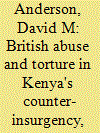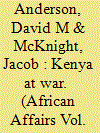|
|
|
Sort Order |
|
|
|
Items / Page
|
|
|
|
|
|
|
| Srl | Item |
| 1 |
ID:
138341


|
|
|
|
|
| Summary/Abstract |
Debate on the ‘securitization’ of aid and international development since 9/11 has been anchored in two key claims: that the phenomenon has been driven and imposed by western governments and that this is wholly unwelcome and deleterious for those in Africa and elsewhere in the developing world. This article challenges both of these assumptions by demonstrating how a range of African regimes have not only benefited from this dispensation but have also actively encouraged and shaped it, even incorporating it into their own militarized state-building projects. Drawing on the cases of Chad, Ethiopia, Uganda and Rwanda—four semi-authoritarian polities which have been sustained by the securitization trend—we argue that these developments have not been an accidental by-product of the global ‘war on terror’. Instead, we contend, they have been the result of a deliberate set of choices and policy decisions by these African governments as part of a broader ‘illiberal state-building’ agenda. In delineating this argument we outline four major strategies employed by these regimes in this regard: ‘playing the proxy’; simultaneous ‘socialization’ of development policy and ‘privatization’ of security affairs; making donors complicit in de facto regional security arrangements; and constructing regime ‘enemies’ as broader, international threats.
|
|
|
|
|
|
|
|
|
|
|
|
|
|
|
|
| 2 |
ID:
116256


|
|
|
|
|
| Publication |
2012.
|
| Summary/Abstract |
Accusations of abuse and torture in the counter-insurgency campaign against Mau Mau rebels in Kenya were widely publicised during the 1950s. The typical British response was to issue official denials, and when prosecutions did arise the perpetrators were characterised as pathological, their behaviour presented as isolated and exceptional. New evidence found in the British colonial 'Migrated Archive' for Kenya now confirms that the practice of torture and abuse was widespread, amounting to a systematic pattern of state policy. This article rejects dispositional and individual explanations of British torture in Kenya and instead examines the violence in temporal and structural terms, showing how the toleration of violence at an early stage of the Emergency led to its institutionalisation in Kenya's detention camps at a later stage. The article offers evidence from the screening process in the first phase of the counter-insurgency campaign, and from the 'dilution technique' applied in the detention camps after 1956 in the final phase of the war to illustrate the argument. The concluding discussion explores the dilemmas confronting Kenya's colonial violence workers and their political masters as they struggled to present torture as lying within the 'rule of law'.
|
|
|
|
|
|
|
|
|
|
|
|
|
|
|
|
| 3 |
ID:
137753


|
|
|
|
|
| Summary/Abstract |
Kenya’s invasion of southern Somalia, which began in October 2011, has turned into an occupation of attrition – while “blowback” from the invasion has consolidated in a series of deadly Al-Shabaab attacks within Kenya. This article reviews the background to the invasion, Operation Linda Nchi, and the prosecution of the war by Kenya’s Defence Forces up to the capture of the city of Kismayo and the contest to control its lucrative port. The second section discusses Al-Shabaab’s response, showing how the movement has reinvented itself to take the struggle into Kenya. We conclude that while the military defeat of Al-Shabaab in southern Somalia seems inevitable, such a victory may become irrelevant to Kenya’s ability to make a political settlement with its Somali and wider Muslim communities at home.
|
|
|
|
|
|
|
|
|
|
|
|
|
|
|
|
| 4 |
ID:
095991


|
|
|
|
|
| Publication |
2010.
|
| Summary/Abstract |
The sharp escalation in ship hijackings by Somali pirates on one of the world's most important trade routes, highlighted by the headline-grabbing seizures of the Ukrainian MV Faina, with its cargo of tanks and heavy weapons, in September 2008 and the fully laden Saudi-owned tanker Sirius Star two months later, shows little sign of abating. In November 2009, the European Security Forum at the Centre for European Policy Studies in Brussels, co-sponsored by the IISS, addressed the question of 'Somalia and the Pirates'. These three essays, offering a range of contexts for the new piracy, are shortened versions of three of the papers presented. A fourth, on Somali security issues more generally, appears elsewhere in this issue.
|
|
|
|
|
|
|
|
|
|
|
|
|
|
|
|
|
|
|
|
|